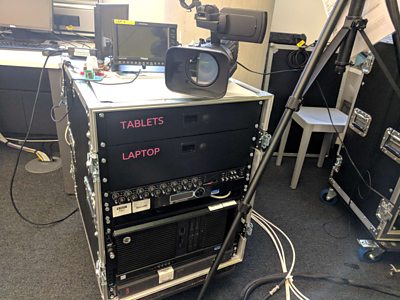大象传媒 R&D are looking at taking our IP Studio technology out of the lab and into the field for a wider-range of trials. As broadcasting and IT continue to converge, can we learn from the fields of site reliability engineering and devops as we build our IP studios?

Since 2012, we have been running our IP Studio project to help us realise the opportunities that IP-based broadcasting and production can give, uncovering challenges along the way. This work has been fundamental to the next-generation broadcasting standards and specifications that are emerging, leading to the development of and . These new standards represent a fundamental change in broadcasting, as they build on top of existing IT specifications and patterns, SMPTE 2110 building on top of IETF's and IS-04 using the that power the modern web.
These standards are forming the core of , but our ambition goes beyond moving to IP-based networks, and to instead unlock the flexibility of software-based studios. IP Studio is a completely software-based system, running on Linux on off-the-shelf servers and desktops. Being in software allows us to make changes quickly, spin up virtual studios in the cloud and reduces the cost of our development efforts. It's also allowed us to run several trials on top of this completely software-based studio technology, starting with the , and more recently as part of .
Going hand in hand with our ambitions to build an , we also want to build an IP studio capability to allow production teams the ability to do outside broadcasts with nothing more than a few cameras and an Internet connection. We successfully demonstrated this capability at the 2017 Edinburgh festival and where the remote production capability was in the cloud. Although these trials demonstrated that capability, there were technical hitches along the way which shows that the technology has yet to mature, and this new trial platform will allow us to further identify and solve these.
One question we're asking is whether or not we can take an IT-first approach to building and running this new platform. Instead of approaching the problem as broadcast engineers, can we instead do so as software and systems engineers from an IT background and take the learnings we have from running our large software-based 大象传媒 Online estate to run our TV & radio production systems too?
is a term that originated at Google to describe their approach to building and running their at-scale production systems. Instead of isolation operations and development skills, can development skills be applied to make operations more effective? This has grown wider into a movement known as devops where operations and development teams for a product are completely integrated. For our IP Studio trial platform, we're now looking at building a site reliability engineering team to build and operate this platform based on our existing codebase and knowledge on running remote production trials
There is a reason that TV & radio production has long had it's own branch of engineering in broadcast engineering, which is due to the unique challenges and constraints expected of a production environment. A few seconds outage of a website might not cause huge cause for concern, but expectations for broadcast content is much higher. Broadcast also have the challenges of maintaining low latency for video and audio streams in a production environment, whilst still dealing with the high bandwidths (over 10 Gbps for UHD content).
We look forward to what we can learn from this opportunity to build a platform, to increase the number of trials, and to apply these techniques to these new challenges.
- -
- 大象传媒 R&D - High Speed Networking: Open Sourcing our Kernel Bypass Work
- 大象传媒 R&D - Beyond Streams and Files - Storing Frames in the Cloud
- 大象传媒 R&D - IP Studio
- 大象传媒 R&D - IP Studio: Lightweight Live
- 大象传媒 R&D - IP Studio: 2017 in Review - 2016 in Review
- 大象传媒 R&D - IP Studio Update: Partners and Video Production in the Cloud
- 大象传媒 R&D - Running an IP Studio
- 大象传媒 R&D - Building a Live Television Video Mixing Application for the Browser
- 大象传媒 R&D - Nearly Live Production
- 大象传媒 R&D - Discovery and Registration in IP Studio
- 大象传媒 R&D - Media Synchronisation in the IP Studio
- 大象传媒 R&D - Industry Workshop on Professional Networked Media
- 大象传媒 R&D - The IP Studio
- 大象传媒 R&D - IP Studio at the UK Network Operators Forum
- 大象传媒 R&D - Industry Workshop on Professional Networked Media
- 大象传媒 R&D - Covering the Glasgow 2014 Commonwealth Games using IP Studio
- 大象传媒 R&D - Investigating the IP future for 大象传媒 Northern Ireland
